Education, Aces, and Transgender Players – State of Disc Golf
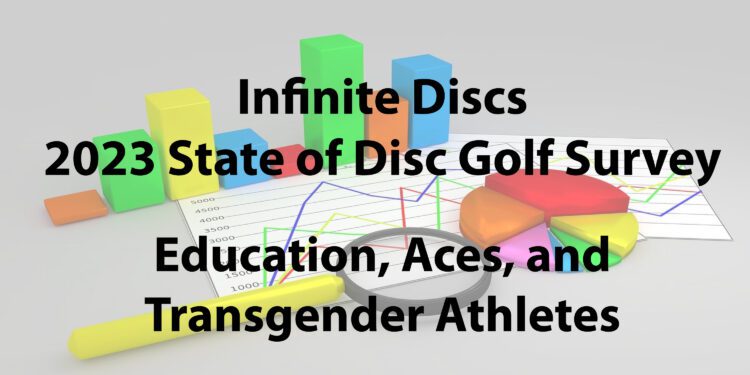
Throughout our annual State of Disc Golf survey results blog series, we’ve talked about almost all of the poll questions. We’ve covered our demographics, tournament interests, and what we do or do not know about certain brands. We’ve talked about pros, how many discs we own, and what we look for when buying a disc, among other subjects. In other words, we’ve covered a lot of ground. However, we ended up with a few extra poll question that we still need to address.
We still need to find out how we responded to questions about our education, how we keep score in casual rounds, our ace numbers, and transgendered women playing in FPO. Realistically, I could have included each of those in one of the other blogs. But, they got skipped over. So let’s address them now!
Education
Although there were a couple percent of us (1.8%) who didn’t graduate high school, there are also a couple percent of us who are too young to have finished yet. There are 3.7% of us under the age of nineteen. That could easily account for most of those who didn’t graduate. For reference, the Department of Education stated that the graduation rate in the US is around 90%, and that number has been climbing for decades.
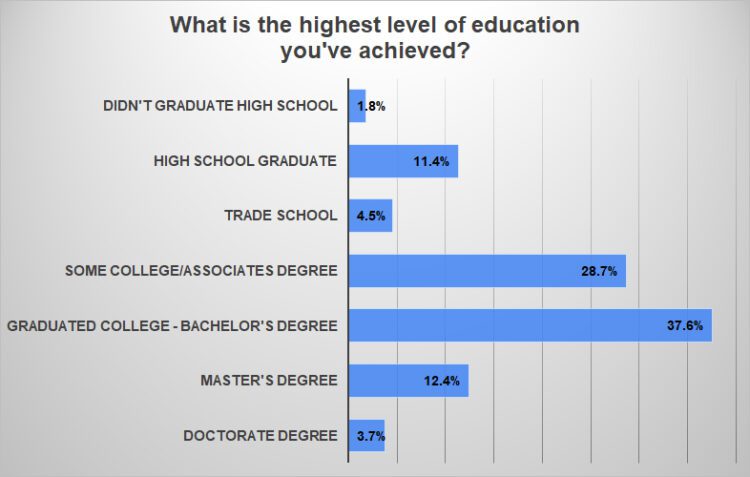
If you look at the percentage of us who went to a Trade School or got a degree, that accounts for over 57% of us. As for the 28.7% of us who got some college, we can also say that a certain percentage of respondents are still going and will end up graduating.
Comparing disc golfers to the general public, we have a higher percent of us who got a Bachelor’s Degree. The survey puts disc golfers at 37.6%. The US census (for 2021) shows that 23.5% of Americans got a Bachelor as their highest degree.
The advanced degrees for disc golfers were a little closer to the US average, but still higher. There were 14.4% of the US population with advanced degrees (Masters or Doctoral), and there were 16.1% of disc golfers with advanced degrees. Regardless of our education, I think we can all agree that we are smart enough to pick up a great sport like disc golf!
Keeping score
When it comes to keeping score in a casual round, I’m glad to see so many people use an app. If more rounds are recorded, it’s easier to take that data to a city or town and propose a new course. Most municipalities like the idea that a new course might draw in people from surrounding areas, as well as take care of the needs of their own residents.

There were 68.6% of us who indicate we use an app to keep score in casual rounds. Although there are numerous apps on the market, UDisc is the biggest. That app keeps score, give you stats, and helps you know how far you’ve thrown.
The number of people who either don’t keep score, or do so in their head, is around 29%. And a small percentage of us who still use a physical scorecard. Since there are reusable, waterproof scorecards that attach to your bag, it can be even easier to use a physical scorecard. However, most people would rather use their phone.
ACES
According to the Ken Climo Wikipedia page, The Champ had 103 aces in his 20-year PDGA career. That is five per year, and that is just in PDGA sanctioned competitions. Some people just seem to hit more aces than others. Part of that depends on the courses being played. But, part of that is skill (or luck!). In the survey, we asked how many aces people got last year. Let’s see how many people racked up some aces.
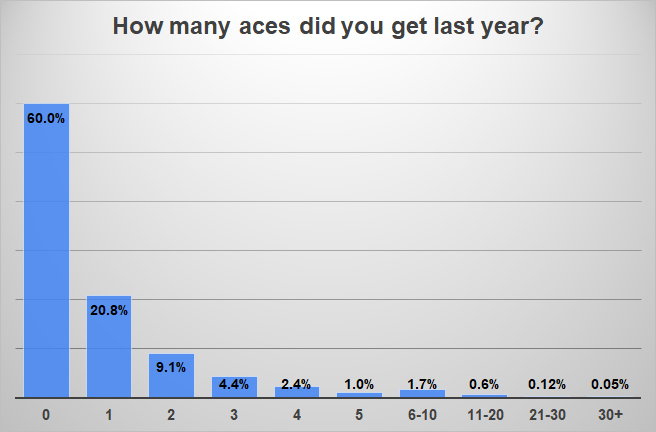
A whopping 60% of us didn’t card a single ace last year. If you happen to play longer or more difficult courses, you really don’t even have ace opportunities. Plus, even on the holes that you can reach, you might be laying up your shot for an easier birdie. If you come close to getting an ace, but miss the basket, you’re usually looking at a longer comeback shot.
One in five of us got one ace last year. And 9.1% got 2 aces. That means 90% of us got two or fewer aces. And only a handful of people (11 people) got 21 or more. I would be interested to see the average hole length for those aces.
Transgender Disc Golfers
If you follow the tournament scene in disc golf, you’re probably aware of the wild ride that transgender FPO player Natalie Ryan went on last weekend (as of this writing) at the OTB Open. In case you weren’t aware of her situation, Natalie is suing the PDGA and Disc Golf Pro Tour (DGPT) in California because of a new PDGA rule regarding transgender players. (The rule can be seen HERE). That rule precluded her from playing at the Pro Tour competitions.
Just before the OTB Open, Natalie’s lawyers sought a temporary restraining order to allow her to play. The California court ruled in her favor, and she was allowed to play the opening round. However, the PDGA and DGPT then filed an appeal in the Ninth Circuit Court, which reversed the restraining order and prohibited Natalie from continuing to play, due to the PDGA rule. (If you are interested in the legal aspects of this and other disc golf related cases, check out the Disc Golf dot Law YouTube channel HERE.)
Which brings us back to the survey. We asked how you felt about the rule. Is it a fair policy? Is it unfair for transgender women? We narrowed the choices down to four options, out of necessity. Since there is much nuance to the subject, and a lot of strong opinions, we didn’t allow people to write in answers. That basically makes the data unusable, since there is such a variety of opinions. If you didn’t agree with three of the answers, you were able to select “No comment/other”.
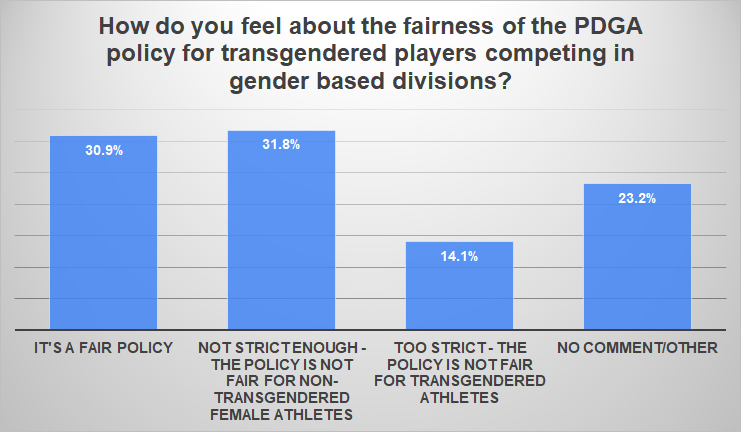
A lot of people chose No comment/other as their answer. Nearly one in four either didn’t think the options fit their opinion, didn’t want to comment, or possibly haven’t come to a conclusion about how they feel. That is a significant number of people. There were 14.1% of us who felt the policy is too strict and unfair for transgender athletes.
Two categories that received the highest percent of people who selected them are the 31.8% of people who thought the ruling was not strict enough, and unfair to non-transgender female athletes (Chromosomally female, etc., as listed in Part A of the rule), and 30.9% who thought the rule was fair.
Since men make up a majority of those taking the survey, if we break the results down according to gender, the men’s chart looks pretty similar to the overall numbers. However, here are the results of the women who took the survey:
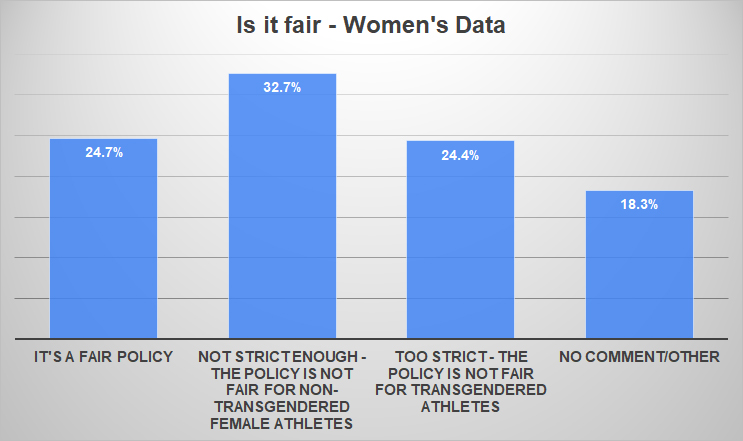
There is a significantly smaller percent of women who think the policy is fair, versus the total number, and a larger percentage who think it is not fair for transgender athletes. Also, a smaller percentage of women who indicated No comment/other. In light of the numerous FPO players who have vocally opposed Natalie playing in FPO, I would have thought those two results would have been different.
We’ll see how Natalie’s lawsuit turns out, and what impact it might have on disc golf.
That’s all for this year’s State of Disc Golf survey! See you next year!
